Published: 31 July 2019
“Student politics is so nasty,” Henry Kissinger said, “because it matters so little.”
We were student politicians, and we had this emblazoned on our factional t-shirts, with the slogan ‘doing numbers for the revolution’ and a propaganda cartoon of a nuclear family marching forward, holding hands.
It was ironic in that way you can only manage when you’re half smart and young and droll enough to pick a political side, but not actually a team. Our faction was an impossible coalition of radical independents; we called ourselves ‘the non-aligned left’. Years later, I read a Martin Amis novel where a fictional novelist names her book The Ironic High Style and I finally got the joke.
But, back then, in the early 1990s, when I was an undergraduate who’d grown out of acne but not childishness, humour was something to take very seriously. The spirit of the times was to resist engagement, with social movements or with hope. Nirvana had just toured Australia, their bleak anthems had one unifying message: if you must engage, do so with sarcasm. The most interesting activists I’d met personally then were ‘culture jammers’ who went around cities changing all the ‘B’s on signs for banks to ‘W’s.
“We did ‘numbers for the revolution’ when the concrete shape of the goal was imperceptible and persisted while the blurry object was impossible.”
It may have been the golden age of ironic high style. My children’s corner of the left were doing numbers for the revolution in 1993 because the great revolutionary projects of our century had tried earnestness and uprising. They’d had red armies and guerrilla wars and street occupations, they’d seized the means of production and the apparatus of the state – and they’d failed. Millions had suffered, millions had died. The Berlin Wall fell down in 1989, the Soviet Union was over two years later. What lay under dreams of a realised socialist paradise turned out to be a crappy authoritarianism that could always guarantee secret police, but never toilet paper – yet its replacement was not freedom. It was a new McDonald’s in Moscow and a David Hasselhoff concert at the Brandenburg Gate. An East German child interviewed on TV told the world what she was looking forward to the most was buying a Barbie doll. Oh, communism was over… but it sure wasn’t hard to hate capitalism. The difference between our radical generation and the glamorous one that preceded it – battles on the streets of Paris in long, leather jackets, riots in Chicago in brightly coloured, patterned shirts – was that our forebears, at least, could still imagine ‘the alternative society’. The best we could conjure was a parallel one, where – between holding down the new underpaid, unstable ‘McJobs’ Doug Coupland described in Generation X – we might amass in the odd empty warehouse or decaying rental to mosh like the crowds in the Smells
Like Teen Spirit video, and there defy the increasingly airbrushed world for sale outside by bruising our bodies for free, with slamdances and headbanging, drunken stumbles, cheap weed and experiments with heroin. The tribe that spawned our faction dyed unbrushed hair every chemical shade of yellow, burgundy or black and drank bourbon and vodka, gripping the bottles in fists that yet nursed cigarettes, fingers festooned with silver rings.
Our political materialisation was just as rough and cheap and largely improvised: guerilla drops of snarky zines that satirised anything that could be jammed into photocopier, adrenalin fuelled graffiti runs and paste-ups late at night, lock-ons, street protests, occupations. Every time we hit the streets, we threw ourselves at the inevitable cops and their batons with the same nihilistic enthusiasm we brought to the moshpit. What the cops didn’t understand was that the spilled blood, split lips and broken fingers weren’t deterrents – they were what brought us back. When a cop dislocated my shoulder at a demo, I wore the agony like a laurel. It was just so nice to feel something. In other parts of the student left, the tendency ran in the opposite direction: comrades died of heroin overdoses.
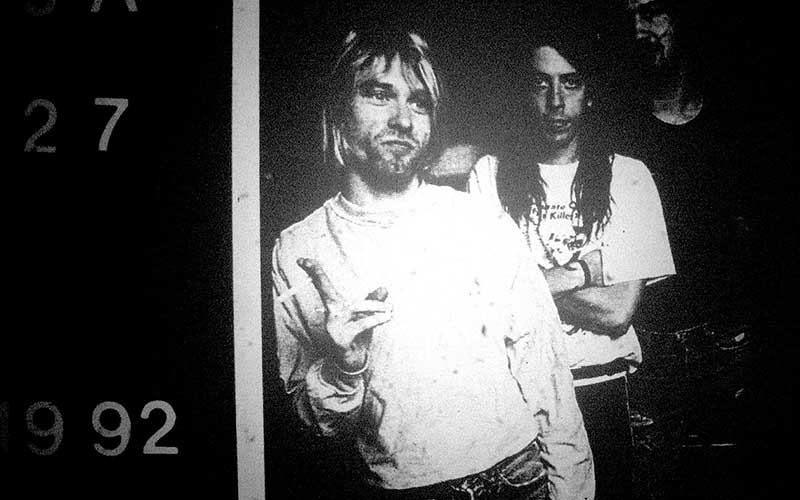
Nirvana - 1992, Picture: davetoaster
We ran for election to the student unions because we wanted access to the photocopiers and student press, and to get our hands on phones that could activate a telephone tree that could mobilise quick mobs to protest politicians, right-wing priests or fast food outlets, or a fax machine that could dare the adult media to report on them. Our opposition on the campuses were the disciplined, careerist social democrats of the then-in-government ALP. They were seeking of the student unions CV-defining titles that might lead to jobs as staffers or for unions – Paul Keating’s children, they did numbers not for revolutions, social democracy or any other reason than there were numbers out there to be done. In the elections, they standardised tactics like pissing in ballot boxes to spoil votes. We retaliated with midnight missions at conferences to plant unspeakable things in their food. Though they wore fewer rings and rarely dyed their hair, our mirror reflected bleakness back to us. Their black t-shirts said: “Clowns to the left of me. Jokers to the right. Here I am – stuck in the middle with you.” We fucked them, of course. The seductions were as detached, ironic, loveless, nicotine stained, frantic and chemical as the decade in which they took place. I was wearing a dress made from a paisley bedspread when a boy in a baseball cap, jeans and a pair of RMs touched up my leg while we drunkenly smoked cigarettes and pretended to drink tea – rutting erupted in a brick walled room down the hall, my dress was torn. When these modern lovers were spent, there was no exchange of numbers, nor even goodbyes.
Consistent reports suggested similar fraternisations shared this last-nighton-earth and grubby quality. My friend Nadia took her own cap wearer into her body against the walls of the Sydney Uni quadrangle, her tie dyed slip dress pushed up to her waist, her Doc Martens boots – still-laced – hauled high in the air. In Melbourne’s Exhibition Gardens, Lulu gave her breasts to the eager hands of another one of these boys, dirty mouth smeared to mouth in the leafy dark within stumbling distance from the pub. He was engaged to marry a girl from his home town, too, that boy. And he did.
If we fucked like the world was ending, it wasn’t because we actually believed it. No – the Cold War was over, and the more terrifying fear left in its wake was that we’d woken up doomed to a world that would remain the way it now was, forever. Perhaps we all felt obliged into intense, personal dramatics just to keep our generation’s political story interesting. Neoliberal at the time, philosopher Francis Fukuyama had just published The End of History and the Last Man – a tome as brutal as any beating by cops or turned-backfarewell from a one-night lover. With the death of communism, Fukuyama declared the triumph of the market economy and liberal democracy would be ongoing and perpetual. We in radical student left denied it, chastised the analysis, derided the man… but, at night, the thought did gnaw at our bones, and an old song became a generational earworm:
“Is that… all there is?”
“Is that… all there is?”
Fukuyama had not foreseen that only a few years later that two planes flying into the twin towers of American capital would shatter cities as we knew them and entirely redraw the whole world’s expectations of the new century. And he didn’t realise that the fringe prophets soothsaying environmental catastrophes were, yes, wild and dramatic – and right. Neither did we.
So, reflecting on that time, I think of our young bodies hurling themselves into thrashing seas of police, risking arrest with spraypaint in hand, the interchangeable brutality of sex and dancing and I have to ask myself: were we merely a subculture with our own specific rituals for masochism? Were we just in it all for some kicks? Or is there, indeed, an instinct the human world fosters in those who are both powerless and capable of desire to yearn and fight – blindly, mutely even hopelessly – for an ideal beyond reach, beyond even distinctness? We defined our lives by this compulsion, we decided our actions on its basis – we did ‘numbers for the revolution’ when the concrete shape of the goal was imperceptible and persisted while the blurry object was impossible. We were not the first. Draw a bow from Spartacus to Wat Tyler, the Tolpuddle Martyrs to the Movement 2 June, an arrow shoots straight from the tradition of political rebellion in the west to what appears to be a perfect definition… of lust.
“I survived with my politics intact because I learned young how the dynamics of political activism match those of a sudden and loveless fuck”
I remember the hard kisses of my enemies and the rubber gloved punches of cops as identical ministrations. “Student politics is so nasty because it matters so little”, but when the nastiness touches you – whether from the right or the left – it’s the reminder it delivers of your smallness that teaches exactly how power is an exercise of wielding superior mass, weight and/or volume. Instrumentalised by another’s desire to control is how we come to understand what it is to desire and control. Some of us learn this within the social arena – from conflict to jobs, riots to election campaigns – some learn it in places as intimate as a single kiss, broken heart, or penetration. Some don’t learn it at all, and it’s hard to imagine how those people survive. So many don’t.
But I survived with my politics intact because I learned young how the dynamics of political activism match those of a sudden and loveless fuck. It fails to ever satiate what it feeds. It’s elusive at its most close. At its most gentle, the blows remain tough. Powerlessness is the first lesson of power.
The ironic high style.
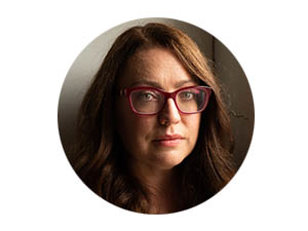
Van Badham
Van Badham is a writer, commentator, activist, occasional broadcaster, theatremaker and one of Australia’s most controversial public intellectuals. In addition to a weekly column for Guardian Australia, her work has appeared in The Age, Australian Cosmopolitan, Daily Life, Southerly, Women’s Agenda, Britain's Daily Telegraph and in anthologies for UQP, Hardie Grant and Monash University Press. She is a frequent guest on panels for ABC’s Radio National, The Drum and Q&A, Channel 7’s Sunrise, the All About Women festival and The Festival of Dangerous Ideas. As a playwright, her work has been performed across Australia and the UK, in the US and Canada, and in Iceland, Sweden, Switzerland, Italy, Slovenia, Germany and Austria.
Photographer: Chelsea Thistlewaite
You May Also Like
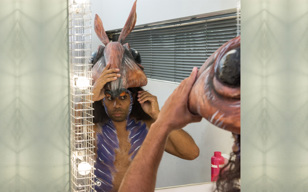
Behind the Scenes
Our Behind the Scenes series takes you on an exclusive journey into the heart of QPAC, where the magic of the stage comes to life.
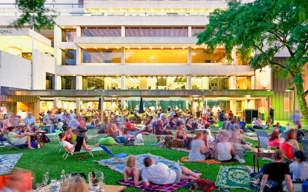
Projects and Events
QPAC is a creative hub where communities come together to celebrate, learn, and grow through the transformative power of the arts.
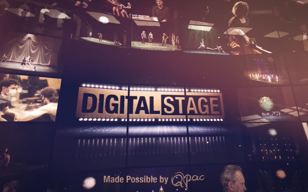
Digital Stage
On-demand performances, live streams and behind-the-scenes.
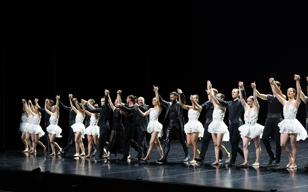
Support
Support QPAC to help nurture and celebrate Queensland's rich artistic heritage while fostering innovation and creativity for the future.


